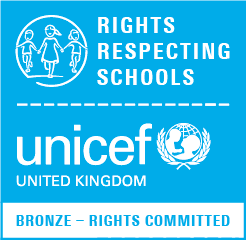We are proud to announce that Charlton Park Academy has achieved Bronze: Rights Committed status as part of our journey toward becoming a UNICEF UK Rights Respecting School. This recognition reflects our commitment to placing children’s rights at the heart of our school ethos, policies, and practices. We are now working towards Silver: Rights Aware, continuing to embed a culture of respect, inclusion, and wellbeing across all areas of school life.

What is a rights respecting school?
The UNICEF UK Rights Respecting Schools Award (RRSA) is based on principles of equality, dignity, respect, non-discrimination and participation. The RRSA seeks to put the UN Convention on the Rights of the Child at the heart of a school’s ethos and culture to improve well-being and develop every child’s talents and abilities to their full potential.
A rights-respecting school is a community where children’s rights are learned, taught, practised, respected, protected and promoted. Young people and the school community learn about children’s rights by putting them into practice every day.
Children as Rights Holders:
Children in our school are recognised as rights holders, entitled to the protections and freedoms outlined in the United Nations Convention on the Rights of the Child (UNCRC). Some of the most fundamental rights we promote include:
- Article 28: The right to an education
- Article 19: The right to protection from harm
- Article 12: The right to have a voice and be heard in matters that affect them
- Article 24: The right to the highest attainable standard of health
We feel it is important that when children learn about their rights it is important that deeper connections are also made in their understanding about the nature of rights so they are taught the ABCDE of their rights.

UNICEF UK rights respecting schools are required to implement four evidence-based standards
- Rights-respecting values underpin leadership and management.
- The whole school community learns about the UN Convention on the Rights of the Child.
- The school has a rights-respecting ethos.
- Children are empowered to become active citizens and learners.
To find out more visit this website: https://www.unicef.org.uk/rights-respecting-schools/
Empowering Children as rights holders encourages them to
- Understand their rights and responsibilities
- Participate meaningfully in school decisions
- Build respectful relationships with peers and adults
- Develop confidence and a sense of belonging

Adults as Duty Bearers
Staff and leaders at Charlton Park Academy are duty bearers, responsible for respecting, protecting, and fulfilling children’s rights. This means:
- Creating a safe, inclusive learning environment
- Valuing pupil voice in decision-making
- Responding to children’s needs and safeguarding their wellbeing
- Promoting positive relationships and behaviour rooted in mutual respect
By embracing these roles, we ensure every child feels safe, valued, and supported, and we lay the foundation for children to thrive socially, emotionally, and academically.
The framework helps schools embed the values of dignity, respect, non-discrimination, and participation into their ethos and everyday practice. It’s not just about teaching children what their rights are—it’s about living those rights through relationships, curriculum, and decision-making.
Whole-School Impact
The framework influences:
- Leadership and management
- Curriculum and classroom culture
- Pupil participation and wellbeing
- School policies, including behaviour and safeguarding
It’s a powerful way to build a school community where every child can thrive—not just academically, but socially and emotionally too.
Within our school, we hold the UN Convention on the Rights of the Child at the centre of everything we do. We have a Rights Respecting School (RRS) we are developing a committee which consists of Rights Ambassadors, from across the school.
As well as the Rights Ambassadors and Student Wellbeing Team we are aiming to are several other school bodies to which the pupils elect representatives, with the aim for these meet a few times each term to give pupil input to school decisions.


